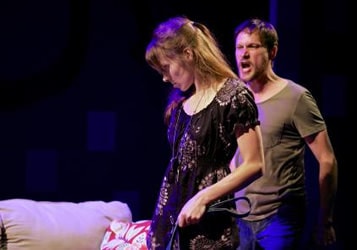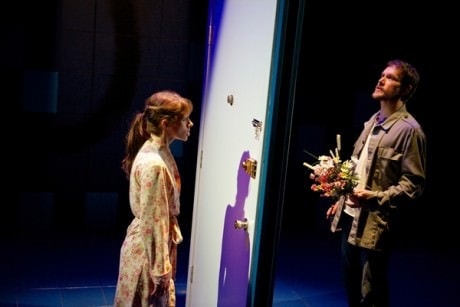H2O Brings Big Ideas to Life
Good plays put people in circumstances that force them to confront essential questions; great plays move people past essential questions to a place where there’s nothing to ask, and leave them there. Jane Martin’s new play H2O puts would-be lovers Jake and Deborah on the road to such a place from the beginning, a place where their paradigms for processing experience must inevitably fail. It makes sure they understand what’s happening to them, and it gives them the tools to change course; then it steps away and watches them run their operating systems into the ground.
The play’s ambiguous title invites us to read it as Hamlet addressing Ophelia, and the action revolves around Jake’s efforts to convince Deborah to play Ophelia in his Broadway production of that great play. Jake is a modern-day Hamlet of sorts: a prince of popular cinema who sees his own outrageous good fortune as evidence that things rank and gross in nature possess the world merely.

“I get anything I want,” he tells Deborah. “I’m filming in Witches Nipple, Utah and I want fresh blowfish sushi for lunch — that gets flown in. Women? I’m a tourist destination… Any impulse I have is rewarded. I am clearly the center of the universe. And the joke is, if you have no boundaries you don’t exist.”
Deborah is a woman with boundaries, “a renewalist Christian…which means I have an interactive sense of God’s presence,” she tells us in the first scene. “Jesus spoke to me and told me acting was my service and my way. ‘I am the Son of David, and this work you must continue.’… So I do.”
Her friends and family think she’s wasting her life and corrupting her call, but she persists. It isn’t easy. In four years working as an actress in New York, she’s done “eleven Shakespeares in parks and parking lots and prisons and in an abandoned hospital, and [she’s] never gotten more than busfare.”
Jake represents the opposite experience. Some time back, he “[caught] a ride to LA with some buddies, [played] music, [worked] for an escort service, [rolled] a couple of drunks, and two months later [he was cast as] Dawnwalker, the superhero who never speaks.” Two sequels earned him thirty million dollars, and made him loathe himself.
He also represents the opposite paradigm. “What is it exactly that Jesus does for you?” he asks Deborah.
“Is that an ironic question or a real question?”
“That, Deborah, is a real fucking question.”
“Makes sense out of chaos.”
“What if it’s just chaos?”
“Same difference, Jake,” she says. He doesn’t think so yet.
Jake has already answered Hamlet’s famous question about whether to be before the play begins: in his first scene he slits his wrists, but Deborah, who has come to audition for the part of Ophelia, interrupts his death. He recovers, concedes that for the time being at least “it’s useful not to be dead,” and decides to use his humiliating fame to mount a production of Hamlet because he has “a Jones for honor,” and he believes that considering suicide and rejecting it as dishonorable, night after night, in public, within the paradigm of Shakespeare’s play, will make him clean.
Deborah seems to think so, too. “You want an argument for the existence of God?” she asks. “Try Shakespeare. He transcends man while showing what man could be.” And she knows that playing opposite Dawnwalker will open the door on “an actual career that I can use to fill my heart and bring people to Christ. But I’m not going to demean my talent and purpose so you can feel better about your infinite confusion and wasteful life.”
But the lady doth protest too much about her purity of purpose, which suggests not only that she’ll wind up taking the part, but also that she and Jake are going to fall in love. Because they’re not only Hamlet and Ophelia but also Benedick and Beatrice, and Hepburn and Tracy, and every other man and woman who hate each other at the start of their romantic comedy. In fact, H2O takes that common trope out of the frivolous realm and gives it a place in serious theater by giving the lovers fundamentally incompatible operating systems which all of us recognize — and which many of us share — and which come from philosophies that cannot be dismissed out of hand. It also gives each of them something that the other desperately wants.
It’s brilliant construction.
It’s also difficult material, because the actors have to show us that they realize all that. Martin’s dialog is highly self-aware; to make it work, the actors have to separate from the characters they’re playing. We should be able to see them step back and consider the lines coming out of their mouths.
As Deborah, Diane Mair gets that separation some of the time. Her long jaw and big eyes make her face look something like a flower tilted up to catch the dew, a pallid flower. She understands that the world-view she’s chosen makes her look like a buffoon, and that only self-awareness can show that she’s not. What gives Deborah’s relationship with Jake so much power is that he forces her to make the Christian choice again and again, in every moment, every time she talks to him. She has to know that she’s doing it, and we have to see that she knows, or she looks like a buffoon.
“I find it infuriating that you offer me the one thing that I truly want but you make it meaningless,” she says — but she knows that what really makes it meaningless is her Christian paradigm, which she has to reconsider and choose again in every minute. “And that — laugh at this one — is the devil’s handiwork.” If you decide to call it that, which you’re free to do if you choose, you have to let me see you make the choice, repeatedly. I can see that choice on Mair’s face some of the time.

The repetition of that choice to see the world a certain way is less obvious in Alex Podulke’s portrayal of Jake. To be fair, one might say that the choosing process itself is less obvious in Jake, who has already decided not to be, but Podulke obscures it further by speaking many of his lines through grimaces or gritted teeth. The anger he projects in many of his scenes seems inconsistent with the resignation one associates with suicide. Director Jon Jory might have made Podulke’s job a little easier by slowing him down.
Both Podulke and Mair must say one thing and think another most of the time, which is how Hamlet and Ophelia talk to each other. The tension created by holding one thing inside and letting something else out is all that keeps them from caricature, and it does that exquisitely. In the end, when Jake tells Deborah no one will ever love her because she’s afraid to let her heart get dirty, what he’s thinking is: “I love you because you won’t let your heart get dirty.” And when she says, “Protect me, Jesus. Your word is powerful, my Lord, and accomplishes your purposes,” what she’s thinking is: “Not powerful enough.”
Running time: 90 minutes, with no intermission.
This world-premiere production of H2O continues at the Contemporary American Theater Festival in Shepherdstown, WV until July 28, 2013. The Contemporary American Theater Festival (CATF) runs July 5-28, 2013. Performance tickets to the Contemporary America Theater Festival can be purchased through the Theater Festival Box Office, which is open Monday to Friday from 11am to 5p.m., by calling 800-999-CATF (2283), or 24-hours a day online by visiting www.catf.org/boxoffice
LINKS
Mark Dewey’s review of Heartless at CATF.
Mark Dewey’s review of Modern Terrorism: Laugh and Laugh and Tremble at CATF.
100 Plays Produced as CATF Kicks off Ambitious 23rd Season by Sydney-Chanele Dawkins.





Thoroughly enjoyed this play and thought Podulke was brilliant. Mair, as well!